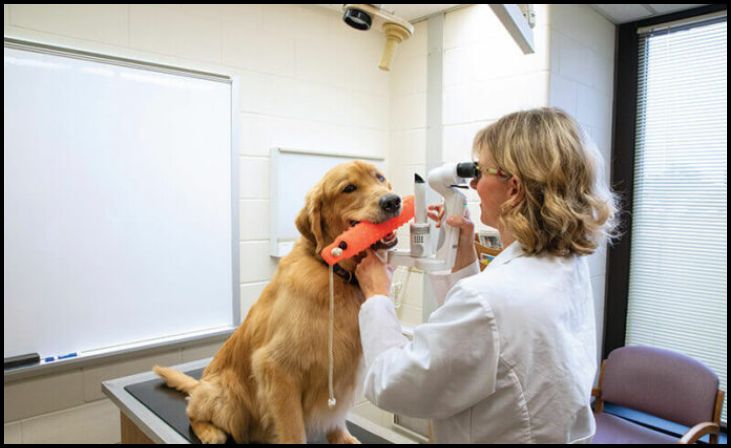Golden Retrievers are one of the most beloved dog breeds, known for their friendly nature, intelligence, and loyalty. Unfortunately, they are also known for their susceptibility to cancer, which has become a significant concern for breeders and owners alike. Recent studies have delved into the genetic factors contributing to this high incidence of cancer in Golden Retrievers, providing valuable insights and hope for the future.
Understanding Cancer in Golden Retrievers

Cancer is the leading cause of death in Golden Retrievers, with nearly 60% of the breed affected by the disease. The most common types include hemangiosarcoma, lymphoma, and mast cell tumors. Hemangiosarcoma, a cancer of the blood vessel walls, is particularly aggressive and often results in sudden death. Lymphoma affects the lymphatic system and can be equally devastating. Mast cell tumors, though sometimes less aggressive, still pose a significant risk.
The Role of Genetics in Canine Cancer
Genetics play a crucial role in the health and longevity of all living beings, and dogs are no exception. The high prevalence of cancer in Golden Retrievers has long suggested a genetic component, but only recent advancements in genetic research have begun to unravel the complexities involved.
Groundbreaking Study on Golden Retriever Genetics
A comprehensive study led by a team of veterinary oncologists and geneticists has made significant strides in identifying the genetic factors that predispose Golden Retrievers to cancer. The study, published in a prominent veterinary journal, involved the analysis of DNA samples from thousands of Golden Retrievers, both healthy and those diagnosed with cancer.
Key Findings of the Study
The research identified several genetic mutations associated with a higher risk of cancer in Golden Retrievers. These mutations were found in genes responsible for cell growth and repair, immune system function, and the regulation of cell death. Specifically, mutations in the TP53 gene, known as the “guardian of the genome,” were frequently observed. The TP53 gene plays a critical role in preventing cancer by repairing DNA or initiating cell death when damage is irreparable. Mutations in this gene can lead to uncontrolled cell growth, a hallmark of cancer.
Another significant discovery was related to the BRCA1 and BRCA2 genes, which are well-known in human breast cancer research. These genes help repair damaged DNA, and mutations can result in a reduced ability to fix DNA errors, increasing the likelihood of cancerous growths.
Implications for Golden Retriever Owners

These findings have profound implications for Golden Retriever owners and breeders. Understanding the genetic predisposition to cancer can lead to more informed breeding practices, potentially reducing the incidence of cancer in future generations. For current owners, this knowledge can guide more proactive health monitoring and early intervention strategies.
Preventive Measures and Early Detection
While genetic predisposition is a significant factor, it is not the sole determinant of cancer development. Environmental factors, diet, and overall health also play crucial roles. Owners can take several preventive measures to reduce their dog’s cancer risk:
- Regular Veterinary Check-ups: Routine health screenings can help detect early signs of cancer, improving the chances of successful treatment.
- Healthy Diet: A balanced diet rich in antioxidants can support overall health and strengthen the immune system.
- Exercise: Regular physical activity helps maintain a healthy weight and boosts the immune system.
- Avoiding Toxins: Minimizing exposure to known carcinogens such as pesticides, tobacco smoke, and certain chemicals can reduce cancer risk.
Future Directions in Research

The identification of genetic markers for cancer in Golden Retrievers opens new avenues for research and treatment. Scientists are now exploring gene therapy and other advanced medical interventions to address these genetic vulnerabilities. Additionally, breeding programs can utilize genetic testing to identify and select against these harmful mutations, potentially lowering the breed’s overall cancer incidence.
Gene Therapy and Personalized Medicine
Gene therapy, which involves correcting or replacing defective genes, holds promise for treating genetic disorders, including cancer. Researchers are investigating ways to apply this technology to dogs, offering hope for more effective cancer treatments in the future. Personalized medicine, tailored to an individual dog’s genetic makeup, could revolutionize veterinary care, allowing for targeted and more efficient treatment protocols.
Conclusion
The discovery of a genetic link to cancer in Golden Retrievers marks a significant milestone in veterinary science. It not only enhances our understanding of the breed’s health challenges but also paves the way for more effective prevention, early detection, and treatment strategies. For Golden Retriever owners and breeders, these findings offer hope and a path forward in combating this devastating disease.
As research continues to advance, the goal is to ensure that Golden Retrievers can live longer, healthier lives, free from the shadow of cancer. Through a combination of genetic insights, responsible breeding practices, and proactive health management, the future looks brighter for these cherished companions.

